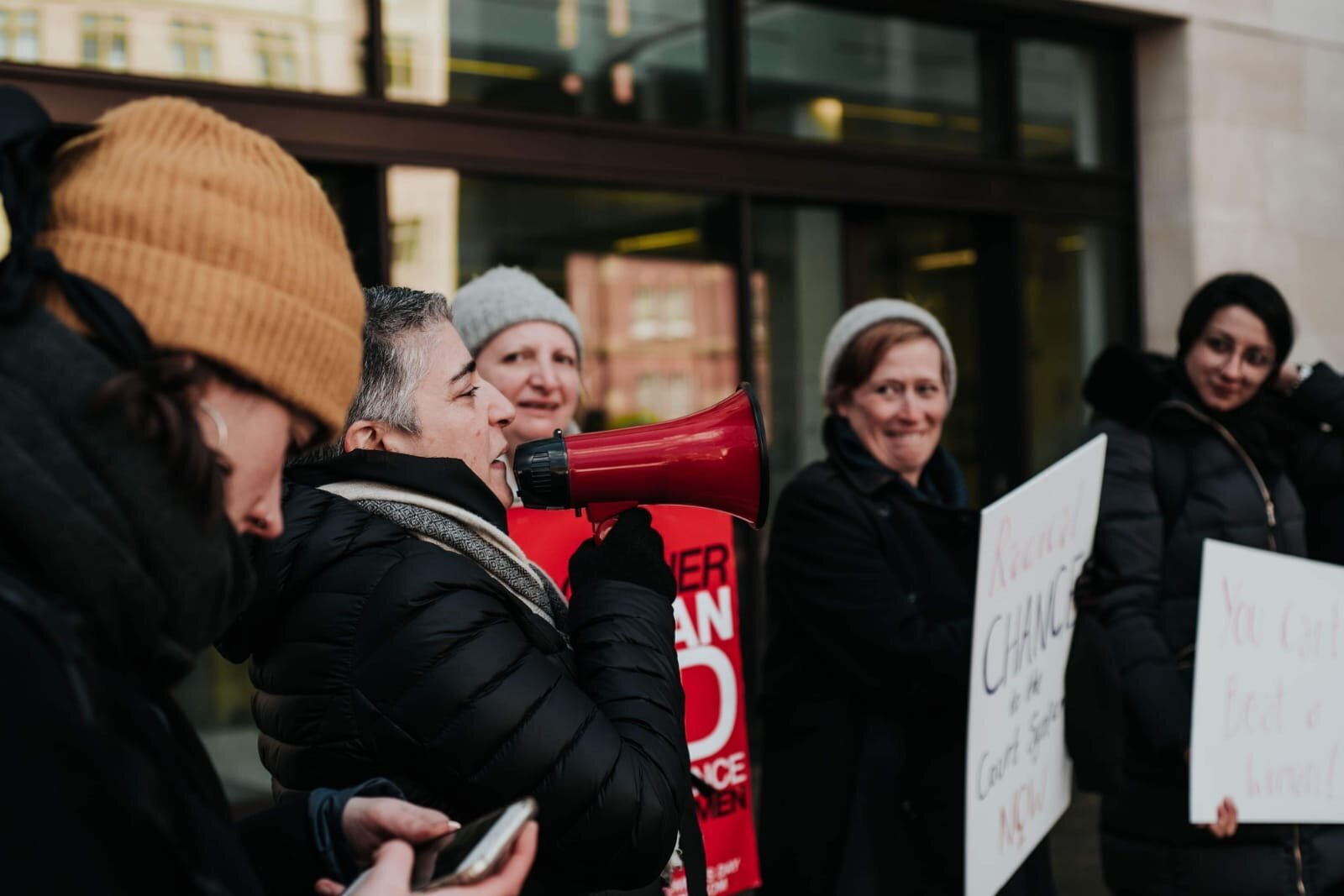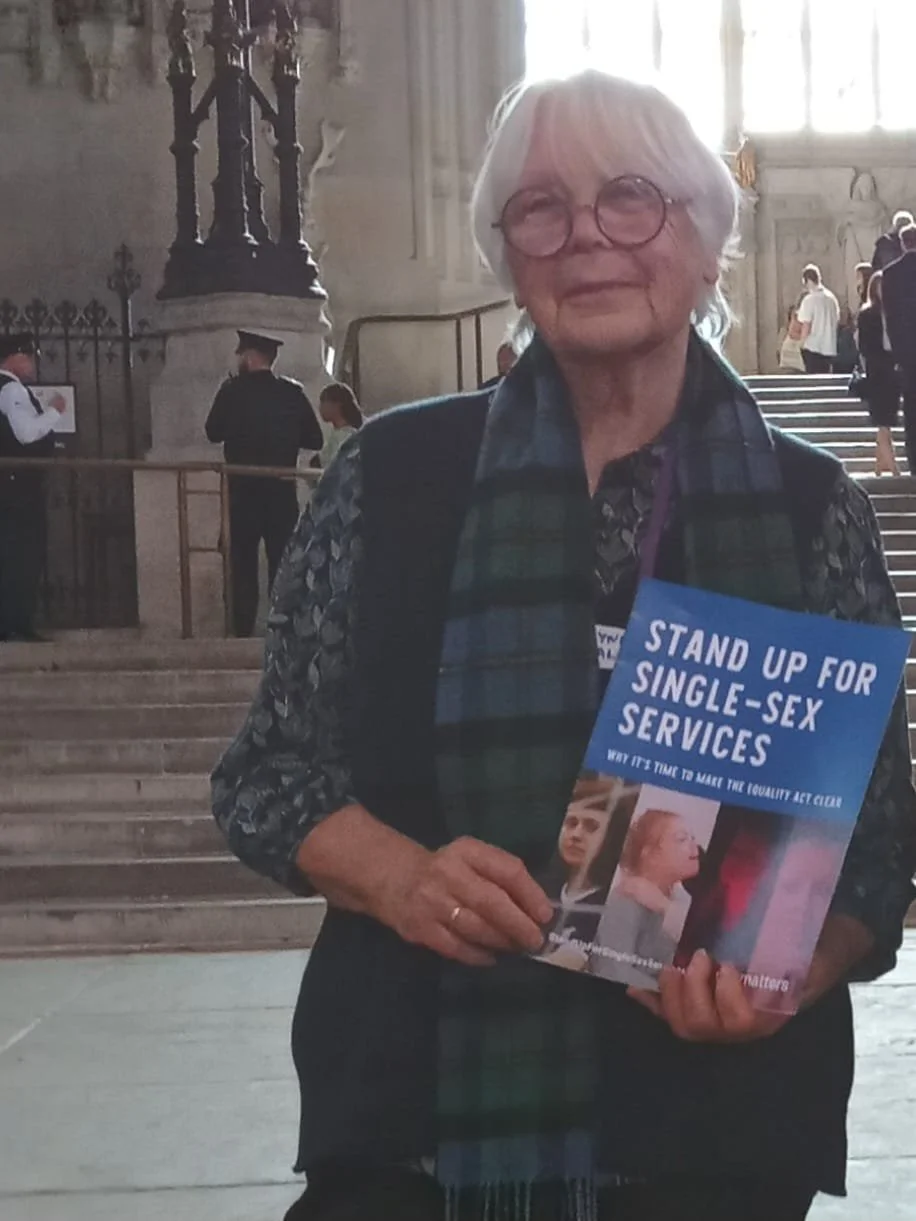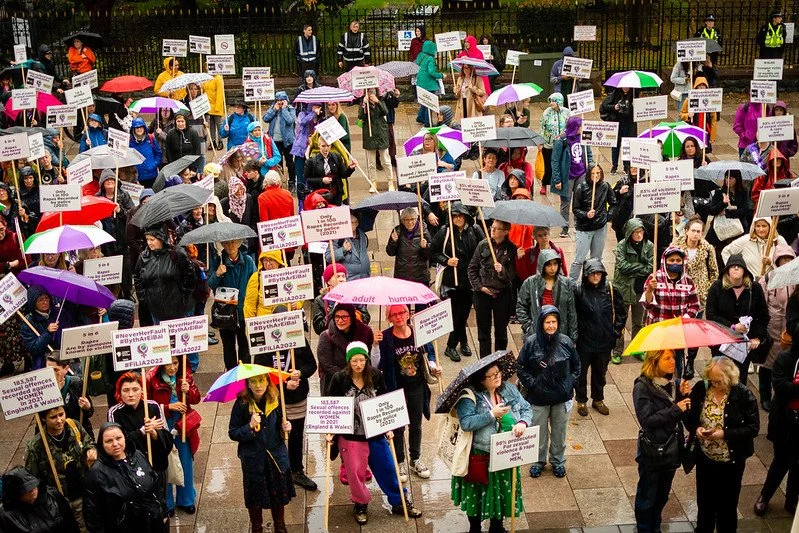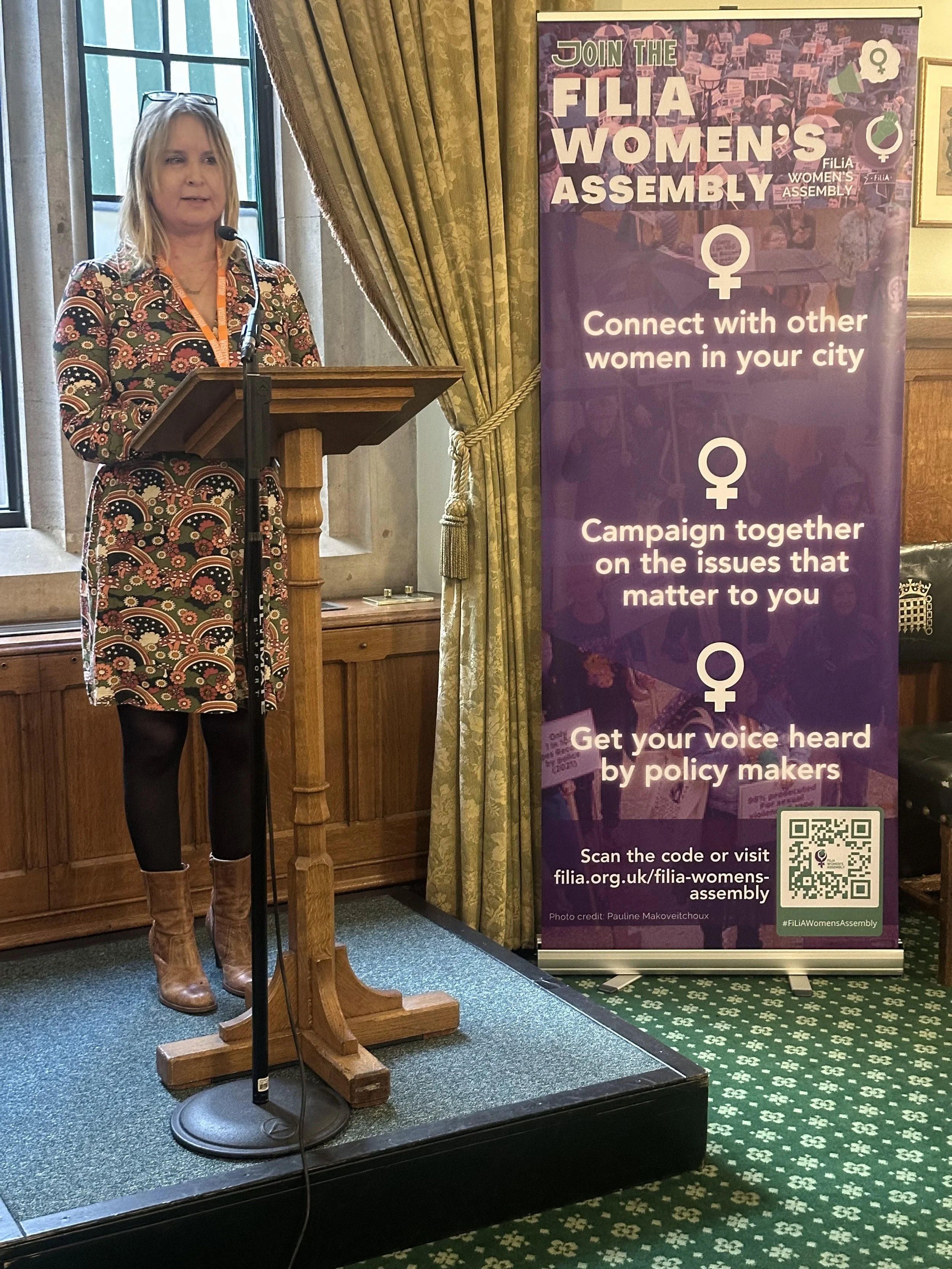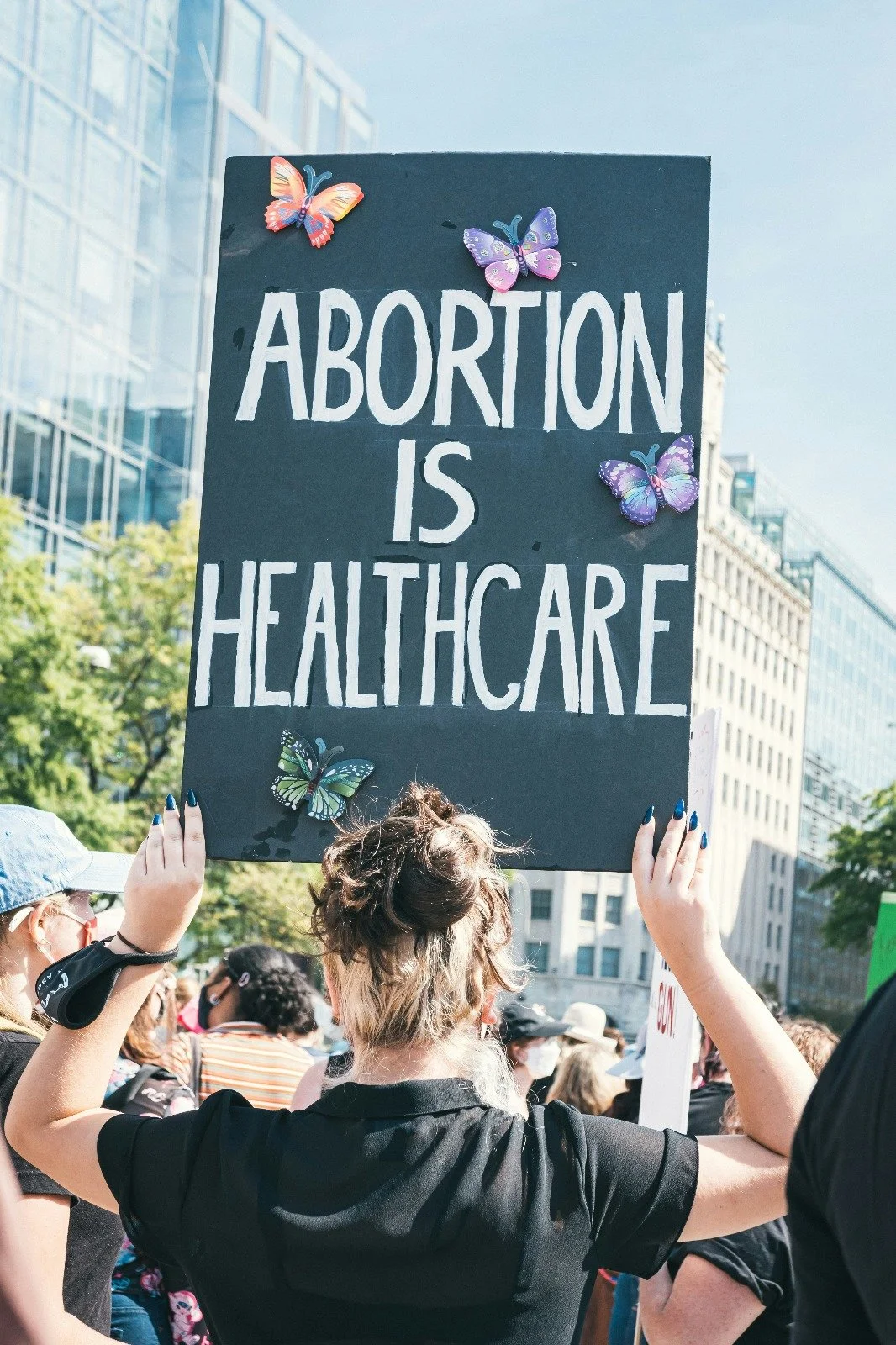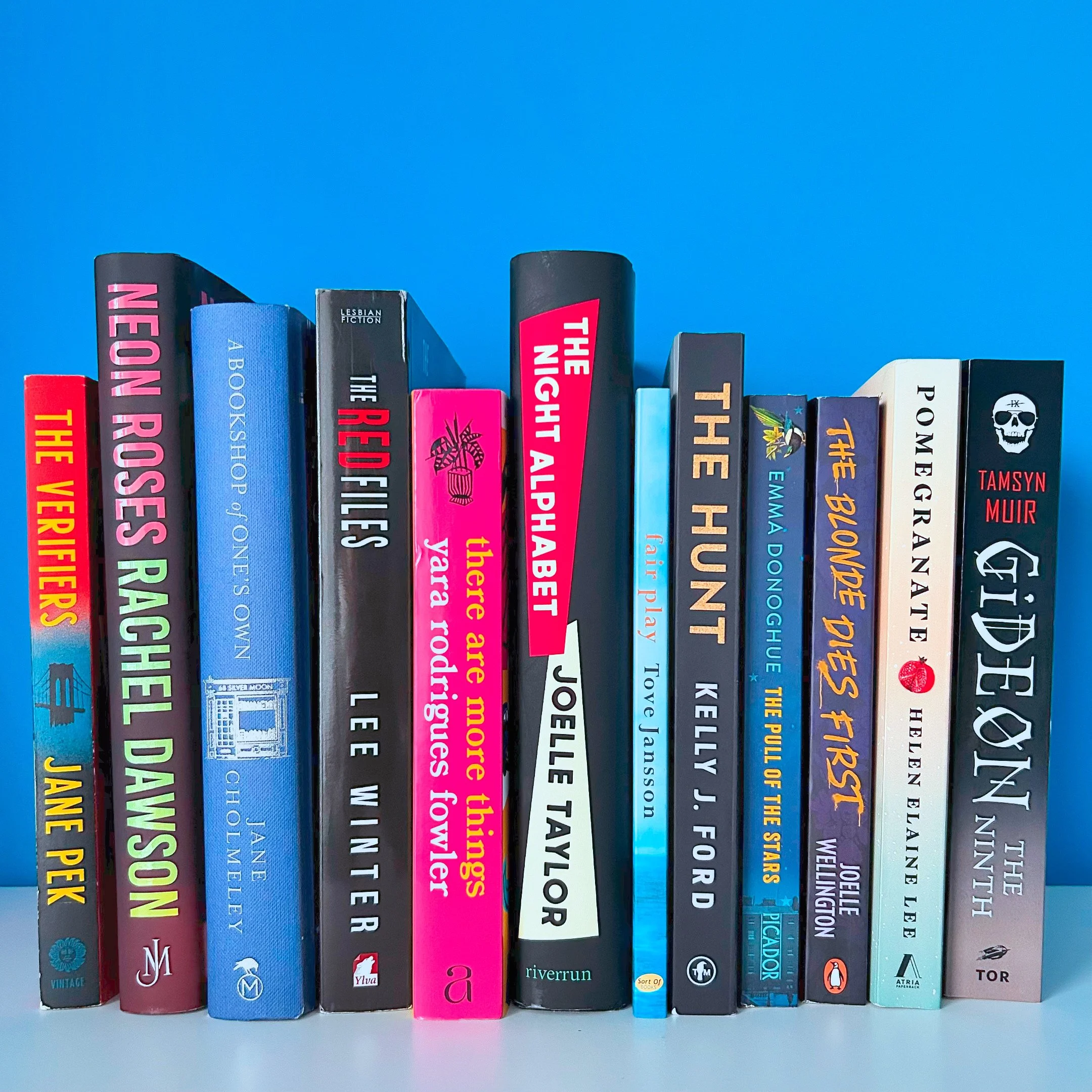When women age we become increasingly invisible in our culture, and this applies even more so to lesbians. This was a short speech given as part of the lesbian stream of workshops and events at FiLiA 2025. It speaks about our identities as older lesbians, some of the issues we are confronted by and the importance of lesbian community and of consciousness-raising groups as a way of exploring the issues of old age and the sisterhood we need to support one another through the difficulties and the joys.
Learn about the causes we are fighting for and how you can get involved.
Narrow your search or read everything.
The International Day for the Elimination of Violence Against Women and the 16 Days of Activism are not symbolic hashtags or polite reminders. They are part of a long feminist tradition of refusing silence, refusing minimisation and refusing the global indifference that too often greets male violence against women and girls (MVAWG). These moments matter because they amplify the truth that patriarchy works overtime to obscure: that MVAWG is not natural, inevitable or random, it is political.
The FiLiA Campaigns and Policy team are pleased to have formally launched the FiLiA Women's Assembly (FWA) and our new report, Making Policy Work for Women, with an event in Parliament on Wednesday 19th November 2025. We are very grateful to Tonia Antoniazzi MP for being our Parliamentary sponsor for this event. She, Fran, a member of the FiLiA Women’s Assembly, and Kruti, FiLiA’s Director of Policy, all gave short speeches at the event and we are proud to share them here.
Rahila Gupta and Beatrix Campbell, two feminist titans whose activism and writing spans a century between them, have written an urgent dispatch from the frontlines of a war, one seemingly without end. The US radical feminist, Kate Millett, once wrote: ‘Perhaps patriarchy's greatest psychological weapon is simply its universality and longevity... Patriarchy has a still more tenacious or powerful hold through its successful habit of passing itself off as nature.’ (Sexual Politics, 1970). As much as feminists have disputed the naturalisation of that oppression, we have to contend with its persistence.
But then, everything stopped.
Two years into my studies, the Taliban returned to power. With a few cruel words, they closed the doors of every university to women. My faculty, once a symbol of hope and purpose, became a silent place where girls were no longer welcome.
They did not shoot me. They did not stab me, but they killed something inside me.
Because when someone takes your education, your purpose, your future, they are not just stealing your rights.
They are erasing your existence. But I am not the only one. I am just one example of more than 20 million girls and women in Afghanistan who are now banned from going to university, entering a park, sitting in a restaurant, or even walking freely in an open space to breathe.
In 2016, gender still meant the socially constructed gender stereotypes and gender roles. They are the root cause of misogyny and male violence against women and girls. They impact access to justice, safety, health care and citizenship. It is because of this that building critical analysis skills around gender was key to education as a way to prevent practices such as (but not limited to) child sexual abuse and exploitation, sexual violence, domestic abuse and female genital mutilation (FGM). My campaign was in memory of a girl who via gender stereotypes of sexual objectification was raped and murdered. The whole point was to make sure girls were safer.
It is remarkable that a women such as Florence Canning could disappear without a trace after devoting nearly ten years of her life campaigning for the vote.
There is no memorial to Florence in Brighton, indeed, there is nothing to remember Florence anywhere, apart from her grave in the churchyard of St Paul’s Church, Tupsley, Hereford, and even that was in need of restoration prior to a successful Crowdfunder in spring 2023.
To Saudi Arabia’s allies in London and Washington: stop treating our lives like a line item on a trade deal. From Trump’s Riyadh photo-ops to his latest pledge of ‘no more lectures on how to live,’ the message is clear: authoritarianism is culture, and repression is tradition—as long as the oil keeps flowing. And from Keir Starmer’s silence, it seems Britain agrees. The economy comes first, human rights second. We’re not asking for heroism. We’re asking you to stop hiding behind diplomacy while our rights are crushed. If you can put human rights on the table when it's Russia or Iran, you can do the same with Saudi Arabia. If you can leverage deals for weapons, oil, and football, you can do it for freedom.
We left the day in awe of Ash and her team in pushing forward with this important bill. We will continue to support it. We know that the more we move towards positive change, the louder the voices of opponents will be. We will continue to amplify the voices of survivors and encourage as many women as possible to support this bill and bring change.
Many of the women we have spoken to feel frustrated with decision makers who seem blind to the female perspective or the impact their work has on women.
Behind our laws, practice and provision, workplace policies or budget cuts, there’s often an invisible bias ‒ one that disproportionately adversely affects women.
And the impact is felt even harder by those at the intersections of race, disability, class and migration status. Too often the needs of women with disabilities, ethnic minority and migrant women, lesbians and women living in poverty are ignored, their voices sidelined, and their struggles compounded by policies that never considered them in the first place.
Then once they've grown into women, the medical model dismisses women as exaggerating pain ‒ simply walking hysterical hormone sacks fainting at the slightest breeze.
Maybe they grow up and find someone to love and support them? But abuse and exploitation of disabled women figures show they are more vulnerable and have fewer services available for them. There are less shelters; they are less able to just quickly jump on a free train and escape and risk losing the services and medication they need.
As FiLiA volunteers, our group consisted of women from different parts of the world. Some of us grew up believing that sex-based violence was mainly an African issue, shaped by the struggles in our home countries. The UK, after all, prides itself on human rights and women’s rights. But as we stood among thousands of women, each carrying their own stories of pain and survival, we realised a harsh truth: violence against women knows no borders.
One of the most terrifying experiences women face is the Home Office Reporting System. For years, I had to report in person every single week, knowing that, at any moment, I could be detained.
The impact on mental health is devastating. The days before reporting are filled with anxiety, not knowing if you will come back, not knowing if that would be your day to disappear into detention.
The fear is relentless. Reporting is framed as a welfare check, but we must call it what it truly is: state-sanctioned psychological warfare. These women already live under strict controls, in National Asylum Support Service accommodation, barely surviving on limited financial support. The Home Office knows exactly where they are. So why force them to report? To keep them in fear.
We all know how we got here. The failure of the left to address the gender identity activism gave this extraordinary open goal to the right. It was all predictable; we predicted it. Now we’re here.
This does not absolve us from thinking critically about the harmful consequences of working with Christian Right groups, including the ADF and the Heritage Foundation, which are coalition partners in Project 2025.
The English version is followed by the French version.
La version anglaise est suivie de la version française.
This article marks the ten-year anniversary of Canada’s prostitution law reform, Bill C-36, also known as the Protection of Communities and Exploited Persons Act. This landmark legislation was a critical step in acknowledging the harms of the prostitution system, aiming to protect women and children from sexual exploitation while reducing demand and incidence. Over the past decade, feminist groups have actively evaluated and critiqued the law’s application, identifying both its successes and areas in need of improvement. This article provides a vital opportunity to understand the ongoing efforts to combat sexual exploitation, the challenges faced in implementing laws that prioritise equality, and the importance of relentless advocacy in the fight for a society free from exploitation.
In North-East Syria, also known as ‘Rojava’ (the Kurdish name for Western Kurdistan), the Syrian state largely withdrew after the people's uprising in 2012. The majority Kurdish population in the region took the initiative and began to establish self-administration on the basis of communes and councils and empowerment of women. From the beginning of the revolution, women organised themselves independently, set up their own communes and councils, participated in all political decisions, and implemented a co-chair-system and gender quotas in all institutions as well as women's and family laws. A women's revolution began in Rojava.
Women have been key to the success of the trade union, and they have reaped huge benefits from the collective successes of the wider labour movement. However, too often, the movement has let women down.
We want to change that.
Join the FiLiA Trade Union Women's Network and help us make unions work for women.
This is not all of us ‒ the killed ones are missing.
This was the chanting of thousands of mostly Women that marched along the Gran Via in Madrid yesterday, accompanied by the drumming of a group of Women dressed in black that seemed to replicate the heartbeat of those of us there and echo the ones of those who are no longer with us.
Here at FiLiA in the Women First team, we firmly challenge the notion of prostitution as being in any way empowering. We consider it another form of male violence. As part of the Women First project, we have interviewed sex trade survivors who collectively have over 100 years’ experience of being in the sex trade. This has included street, escort, sugar daddy and brothel work. Their experiences were all different but many of the themes were similar, namely that trauma and abuse served as a gateway into the sex trade and that it takes time and specialist support to exit and recover from the sex trade.
Kiri Tunks is a veteran trade union and women's rights activist @kiritunks
This blog is based on a speech made by Kiri Tunks on behalf of the FiLiA Trade Union Project at a Labour Women’s Declaration fringe at the 2024 Labour Party Conference in Liverpool. In it, Kiri argues that women need to be at the head and the heart of the labour and trade union movement.
One wonders how the world’s largest human rights organisation, whose main claim is to ‘work to protect people wherever justice, freedom, truth and dignity are denied’ has found itself in opposition to women - some of whom have been victim to the most egregious suppression of their rights and dignity - discussing what has happened to them and why.
Porn and Porn-influenced culture is shaping the way children construct sexual behaviour and relationships. In this blog I outline a number of the harms of pornography and how teachers - as well as parents/carers and other professionals who work with children - can have clear and factual conversations with children about the harms of porn-influenced sexual abuse.
This piece combines the reflections of FiLiA’s Anti-Prostitution Lead Luba Fein and FiLiA’s Spokeswoman Raquel Rosario Sánchez after participating in the 4 th World Congress to Abolish Prostitution. The Congress was organised by CAP International, Canadian-based organisation La Cles, Breaking Free, the Vancouver Rape Relief and Women’s Shelter and the EVA Centre. At the end of the Congress, the organisations launched the Montreal’s Call for the Abolition of Prostitution, which is signed by more than 60 organisations.
Mexican women and men went to their polling stations, the overwhelming majority to vote for a woman to be the next President of Mexico. A woman in charge of a State, which has miserably failed, so far, to guarantee a dignified life for women. Despite national laws, and international treaties, in Mexico women are not free from violence. Every day, the lives of over 64.5 million women in this country are plagued by femicide, and all kinds of violence: sexual, political, economic, reproductive, institutional, symbolic and structural.
Women and nature are both exploited under capitalist patriarchy - both legally and illegally. In addition, the climate crisis already disproportionately impacts women, who comprise 70% of the world's poor and face barriers to migration. Ecofeminism looks to women and nature for solutions to a man-made problem.

